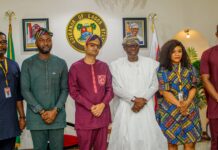Nigeria’s active mobile subscriptions have reached an all-time high of 220,715,961 million as of August 2023, while Teledensity stood at 115.63 per cent during the same period, about one line per citizen.
This means that there is about one line per citizen.
Nigeria’s population is estimated to rise to 223.8 million by mid-2023 from 216 million in 2022, according to a new report by the United Nations.
Also, the number of active Internet subscribers was 159,034,717 Million with broadband penetration at 45.57 per cent as of August 2023.
The Executive Vice Chairman of the Nigerian Communication Commission, Prof Umar Danbatta, made the disclosures at the 18th Abuja International Trade Fair organized by the Abuja Chamber of Commerce and Industry (ACCI) at the Abuja Trade & Convention Centre, Umaru Musa Yar’ Adua Way, Airport Road, Abuja.
This year’s edition of the Trade Fair has the theme – ‘Sustainable Financing and Taxation.
He said over the years the NCC has continued to be a strategic partner to the Commerce, Mines and Industry, as the Commission leverages the Trade Fair platform to engage telecoms consumers and business owners, who are based in various regions of the country.
“Partnering with ACCI through our Special “NCC Day” event is a pleasure for us at the Commission, as it usually provides a veritable platform for interaction with telecoms stakeholders, especially our esteemed telecoms consumers”, he added.
Danbatta said Taxation while essential for funding Government initiatives must strike a delicate balance between revenue generation and industry growth and the role of the regulator, is to advocate for fair taxation practices that do not stifle innovation or place an undue burden on consumers.
While acknowledging the intricacies of tax policies but emphasising the importance of creating an environment where telecommunications companies can thrive the EVC said to address these challenges the Commission continuously engage both the Federal and State Government on the need to harmonize taxation in the telecommunications sector.
“It is in our response to ensuring that Nigeria is competitive in all these areas that the Commission continuously puts a number of regulatory measures in place to ensure seamless access by Nigerians to telecommunications services in order to deepen competitiveness of the Nigerian economy by making our businesses and industries digitally compliant.
“To sustain this, therefore, the NCC continues to create a conducive environment that stimulates deployment of robust telecoms/broadband infrastructure for improving the quality of service (QoS) and quality of experience (QoE) for telecoms consumers, be it individuals or corporates. This is because, as a country, we need robust telecoms infrastructure that will help our industries transition to becoming Information and Communication Technology (ICT)–driven if we hope to be digitally competitive on the global stage.
“The Commission is working assiduously with various stakeholders including you, and the consumers, to see how more businesses can embrace digital platforms for delivering their services to the consumer. As a regulator, we also ensure we constantly inform you, the consumers on how to be protected to prevent cases of online fraud or avoid consumers falling victim of cybercrime antics while in their legitimate use of the Internet” , according to Danbatta.
At the event, the director of the Consumers Bureau, Umar Alkasim reiterated NCC’s commitment to ensuring fair competition and a level playing field for all stakeholders in the telecommunication industry, particularly in safeguarding the interest of consumers from abuse of their rights and privilege, and against unfair practices in the telecom service value chain.














